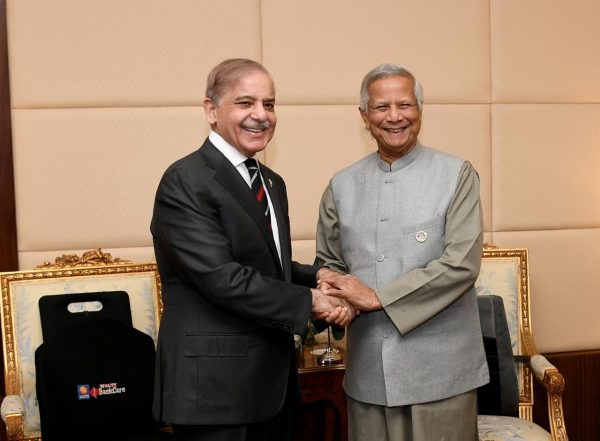Bangladesh’s recent change in government has led to a Pakistan-Bangladesh settlement.
As Muhammad Yunus served as leader of Bangladesh’s interim government on August 8, several high-level meetings were held between Bangladesh and Pakistan, paving the way for new connections and close cooperation. Ta.
Pakistan Prime Minister Shebaz Sharif has met Yunus twice since the change of government in Dhaka. They are bystanders of the United Nations General Assembly in the United States and the D-8 Summit held in Egypt in September and December 2024, respectively. During the D-8 meeting, Yunus urged Sharif to resolve the problem of 1971. “The problems have come again and again. Let’s solve these problems so that we can move forward. It’s great to (solve problems) for future generations,” Yunus said. I said. Yunus had mentioned many years of Bangladeshi demands for an official apology from Pakistan for the genocide committed during the 1971 war.
Pakistan has long argued that the 1974 tripartite agreement between India, Pakistan and Bangladesh resolved these issues. In Cairo, Sharif agreed to investigate “other outstanding issues.”
The bilateral relations between Pakistan and Bangladesh have been plagued by Frosty since the 1971 War of Liberation, particularly during the period of Awami League rule in Bangladesh. The relationship has been thawed since the expulsion of Prime Minister Sheikh Hasina on August 5th last year. And following the Sharif Yunus meeting, Pakistan and Bangladesh moved quickly to improve their bonds.
First, in November 2024, Pakistan and Bangladesh established a direct maritime link between Karachi and Chittagong ports for the first time in 53 years, hoping to create the former desire based on new stages related to trade and business. I emphasized it. On November 18th, cargo ships carrying goods from Pakistan, which contain the main clothing industry and basic food ingredients in Bangladesh, were unloaded at Chittagong Port. It is important to note that Bangladesh has eliminated 100% physical inspection of goods imported from Pakistan as part of its ease of business to promote cooperation in trade, industry and shipping operations. This step not only reduces costs, but also reduces travel time from 40 days to 10-12 days. Previous Pakistani cargo for Bangladesh had to undergo 100% physical checks at ports in Singapore, Malaysia and UAE.
Second, Dhaka and Islamabad have decided to relax visa regulations and establish a direct flight link between Dhaka, Islamabad and Karachi. There are also plans to start freight flights between Dhaka, Karachi and Lahore. Direct flights significantly reduce travel time and allow for more frequent interactions between the business communities of both countries. In January, Pakistan and Bangladesh also signed an agreement to establish a joint business council. Pakistan hopes to export sugar, steel, surgical instruments, cement, dried fruits, pink salt, dairy products, marble and coal to Bangladesh. Next, Pakistan was able to import tea and jute from Bangladesh.
Third, military relations between the two countries have also progressed smoothly since the ex-Hasina expelled. From January 13th to 18th, the Chiefs of Bangladesh’s military division met with Pakistan’s three service chiefs and the co-director of the chairman, Sahir Shamshadmirza. Less than a week after Kamr-ul-Hassan’s visit, a delegation from Pakistan’s Interservice Intelligence arrived in Dhaka for a four-day visit. Bangladesh has shown formal interest in acquiring Pakistan’s JF-17 Thunder Jets as part of its military modernization efforts.
Analysts interpret this involvement as a geopolitical move. However, despite the interaction between military and military, it focuses on trade and connections, and from geopolitics to strengthen and diversify economic relations in neighbouring regions. It is part of an ongoing effort to turn geopolitics into geopolitics.
Over the past few years, Pakistan has taken several steps to increase regional connectivity to promote trade despite the unstable security situation. For example, in 2023, he signed joint protocols with Afghanistan and Uzbekistan, and linked the Uzbek Railway network with the Pakistan Railway through Afghanistan. The route passes through Uzbekistan’s Tamis, Afghanistan’s Mazar y Sharif and logar, and in Pakistan it reaches its peak through the Kram’s Harach border. Similarly, with the help of China, Pakistan is upgrading the 1,300-kilometer Karakolam highway, starting with the New Jiang Kasugar and ending with the Tacot of Kyber Pakhtunkhwa. Recently, Pakistan opened Gwadar International Airport and launched flights between Gwadar and Muscat.
The transition is not easy, but geopolitics continues to dominate Pakistan’s overall strategic calculations, but has made small but steady progress towards this important transition. Pakistan’s macroeconomic indicators have steadily improved over the past year.
However, regional connections and economic cooperation are important to move towards sustainable growth while maintaining the stability of the earned macroeconomics.
In itself, Pakistan does not see evolving relations with Bangladesh through the zero-sum lens where India’s losses are Pakistan’s profits. India-Bangladesh’s trade volume from 2023 to 2024 was around $11 billion. In the same fiscal year, Pakistan’s exports to Bangladesh were $627 million, while imports from Dhaka were about $61.98 million. Therefore, there is no comparison.
Pakistan is restoring its ties with Bangladesh, not India’s successor. Delhi needs to revisit the policy of too much investment in Hasina, which has been reignited, just as Pakistan’s myopia support for the Taliban has caused a blow from Afghanistan.


